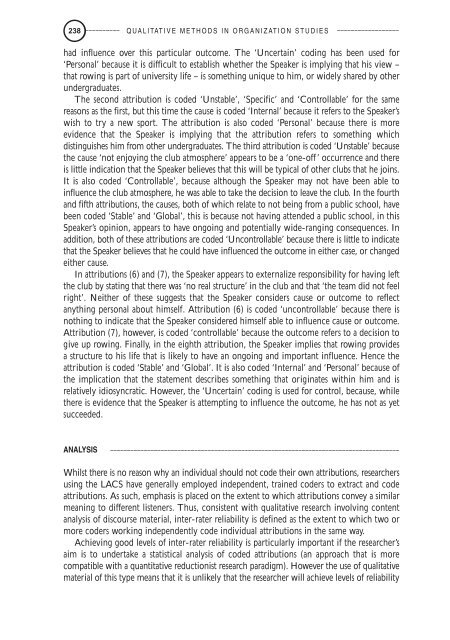essential-guide-to-qualitative-in-organizational-research
essential-guide-to-qualitative-in-organizational-research
essential-guide-to-qualitative-in-organizational-research
- No tags were found...
You also want an ePaper? Increase the reach of your titles
YUMPU automatically turns print PDFs into web optimized ePapers that Google loves.
238 –––––––––– QUALITATIVE METHODS IN ORGANIZATION STUDIES ––––––––––––––––––had <strong>in</strong>fluence over this particular outcome. The ‘Uncerta<strong>in</strong>’ cod<strong>in</strong>g has been used for‘Personal’ because it is difficult <strong>to</strong> establish whether the Speaker is imply<strong>in</strong>g that his view –that row<strong>in</strong>g is part of university life – is someth<strong>in</strong>g unique <strong>to</strong> him, or widely shared by otherundergraduates.The second attribution is coded ‘Unstable’, ‘Specific’ and ‘Controllable’ for the samereasons as the first, but this time the cause is coded ‘Internal’ because it refers <strong>to</strong> the Speaker’swish <strong>to</strong> try a new sport. The attribution is also coded ‘Personal’ because there is moreevidence that the Speaker is imply<strong>in</strong>g that the attribution refers <strong>to</strong> someth<strong>in</strong>g whichdist<strong>in</strong>guishes him from other undergraduates. The third attribution is coded ‘Unstable’ becausethe cause ‘not enjoy<strong>in</strong>g the club atmosphere’ appears <strong>to</strong> be a ‘one-off ’ occurrence and thereis little <strong>in</strong>dication that the Speaker believes that this will be typical of other clubs that he jo<strong>in</strong>s.It is also coded ‘Controllable’, because although the Speaker may not have been able <strong>to</strong><strong>in</strong>fluence the club atmosphere, he was able <strong>to</strong> take the decision <strong>to</strong> leave the club. In the fourthand fifth attributions, the causes, both of which relate <strong>to</strong> not be<strong>in</strong>g from a public school, havebeen coded ‘Stable’ and ‘Global’, this is because not hav<strong>in</strong>g attended a public school, <strong>in</strong> thisSpeaker’s op<strong>in</strong>ion, appears <strong>to</strong> have ongo<strong>in</strong>g and potentially wide-rang<strong>in</strong>g consequences. Inaddition, both of these attributions are coded ‘Uncontrollable’ because there is little <strong>to</strong> <strong>in</strong>dicatethat the Speaker believes that he could have <strong>in</strong>fluenced the outcome <strong>in</strong> either case, or changedeither cause.In attributions (6) and (7), the Speaker appears <strong>to</strong> externalize responsibility for hav<strong>in</strong>g leftthe club by stat<strong>in</strong>g that there was ‘no real structure’ <strong>in</strong> the club and that ‘the team did not feelright’. Neither of these suggests that the Speaker considers cause or outcome <strong>to</strong> reflectanyth<strong>in</strong>g personal about himself. Attribution (6) is coded ‘uncontrollable’ because there isnoth<strong>in</strong>g <strong>to</strong> <strong>in</strong>dicate that the Speaker considered himself able <strong>to</strong> <strong>in</strong>fluence cause or outcome.Attribution (7), however, is coded ‘controllable’ because the outcome refers <strong>to</strong> a decision <strong>to</strong>give up row<strong>in</strong>g. F<strong>in</strong>ally, <strong>in</strong> the eighth attribution, the Speaker implies that row<strong>in</strong>g providesa structure <strong>to</strong> his life that is likely <strong>to</strong> have an ongo<strong>in</strong>g and important <strong>in</strong>fluence. Hence theattribution is coded ‘Stable’ and ‘Global’. It is also coded ‘Internal’ and ‘Personal’ because ofthe implication that the statement describes someth<strong>in</strong>g that orig<strong>in</strong>ates with<strong>in</strong> him and isrelatively idiosyncratic. However, the ‘Uncerta<strong>in</strong>’ cod<strong>in</strong>g is used for control, because, whilethere is evidence that the Speaker is attempt<strong>in</strong>g <strong>to</strong> <strong>in</strong>fluence the outcome, he has not as yetsucceeded.ANALYSIS ––––––––––––––––––––––––––––––––––––––––––––––––––––––––––––––––––––––––––––––––––––––Whilst there is no reason why an <strong>in</strong>dividual should not code their own attributions, <strong>research</strong>ersus<strong>in</strong>g the LACS have generally employed <strong>in</strong>dependent, tra<strong>in</strong>ed coders <strong>to</strong> extract and codeattributions. As such, emphasis is placed on the extent <strong>to</strong> which attributions convey a similarmean<strong>in</strong>g <strong>to</strong> different listeners. Thus, consistent with <strong>qualitative</strong> <strong>research</strong> <strong>in</strong>volv<strong>in</strong>g contentanalysis of discourse material, <strong>in</strong>ter-rater reliability is def<strong>in</strong>ed as the extent <strong>to</strong> which two ormore coders work<strong>in</strong>g <strong>in</strong>dependently code <strong>in</strong>dividual attributions <strong>in</strong> the same way.Achiev<strong>in</strong>g good levels of <strong>in</strong>ter-rater reliability is particularly important if the <strong>research</strong>er’saim is <strong>to</strong> undertake a statistical analysis of coded attributions (an approach that is morecompatible with a quantitative reductionist <strong>research</strong> paradigm). However the use of <strong>qualitative</strong>material of this type means that it is unlikely that the <strong>research</strong>er will achieve levels of reliability



